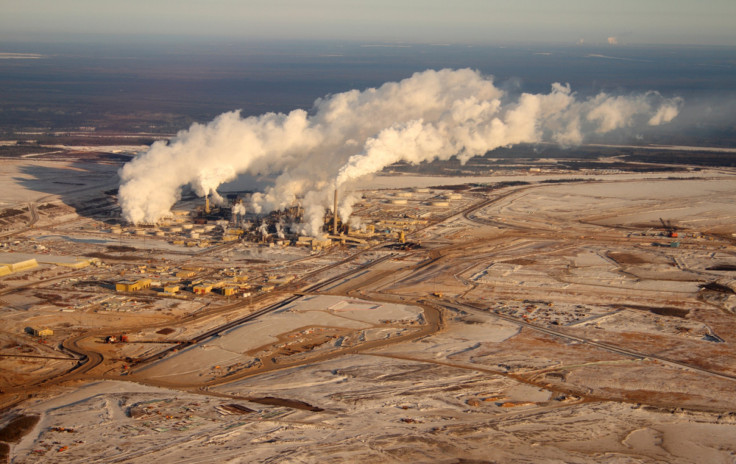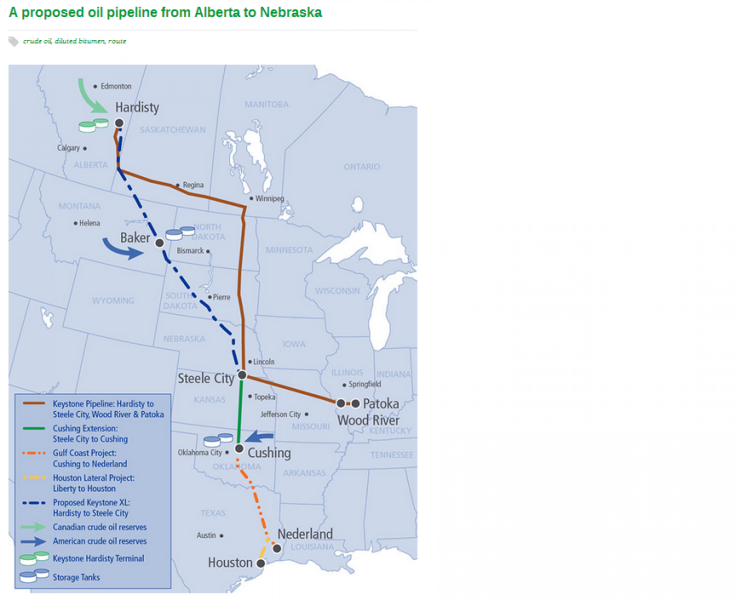How Europe's Energy Policy May Nix Keystone XL Pipeline; Why Europe Doesn't Want Canadian Tar Sands? [Map]

The European Union’s proposed fuel-quality directive, designed to reduce greenhouse gas emissions, could hurt prospects for the proposed Keystone XL project, which aims to link Canadian tar sands and refineries on the U.S. Gulf Coast, an official said Tuesday.
The directive discourages use of high-emission fuels. It defines such fuels as those that require extra energy to convert into petroleum products like gasoline, diesel and heating oil. Whereas conventional crude oil requires a certain amount of energy to convert it into petroleum products, tar sands must first be heated and blended with natural gas to turn it into conventional crude oil. That process results in more emissions than result from processing conventional crude oil. And because of that the EU aims to discourage the import of petroleum products that come from tar sands. If the Keystone XL pipeline is built, the petroleum products that are refined from it would not be welcome in Europe.
“One of our concerns about the fuel-quality directive, because it’s discriminatory and targets the oil sands in an unfair and scientifically inaccurate way, is that it could stigmatize the oil from Canada and impact on our access to some markets,” Joe Oliver, Canada's natural resources minister, said at an energy conference in London.
The Keystone XL pipeline is a proposed 875-mile-long pipeline that will deliver as much as 830,000 barrels per day of crude oil from Alberta, Canada, and the Bakken Shale Formation of the northern United States to refineries in the U.S. Gulf Coast.

TransCanada Corporation (USA) (NYSE:TRP), the company that is proposing the project, is currently waiting for a presidential permit. Barack Obama is the sole person who can approve the pipeline as it crosses the U.S.-Canadian border. Currently he has tasked the State Department with determining whether the project is in the U.S. national interest. A decision is expected to come in the first half of this year.
The EU’s directive is not helping Keystone’s case, as the project is already controversial in the U.S.
For environmentalists the pipeline is one element of the greater cause in fighting climate change. Proponents of the pipeline argue it will reduce America's dependence on oil from hostile, unstable countries in the Middle East and elsewhere.
The president faces mounting pressure to exploit the strategic and lucrative commodity while protecting the environment. All the while the international community will be watching what the U.S. decides to do.
That decision will be difficult to make as the president laid out his climate action plan, an ambitious goal to reduce greenhouse gases by 17 percent in 2020 from 2005 levels.
“The net effects of the pipeline’s impact on our climate will be absolutely critical to determining whether this project is allowed to go forward," Obama said in his much-anticipated climate-change speech in June.
Not only could the EU’s fuel-quality directive indirectly impact the Keystone project, but it could also discourage European refineries from importing crude oil from Canadian oil sands.
“I will say that quite a number of countries share our concerns about the unscientific nature of the directive, it’s potentially negative impact on the European refinery industry, and the fact that it is unlikely to achieve its environmental objective,” Oliver said. “I’m of the view that there is a serious possibility of fundamental change in the directive.”
---Note: Photo by shutterstock.com
© Copyright IBTimes 2024. All rights reserved.






















